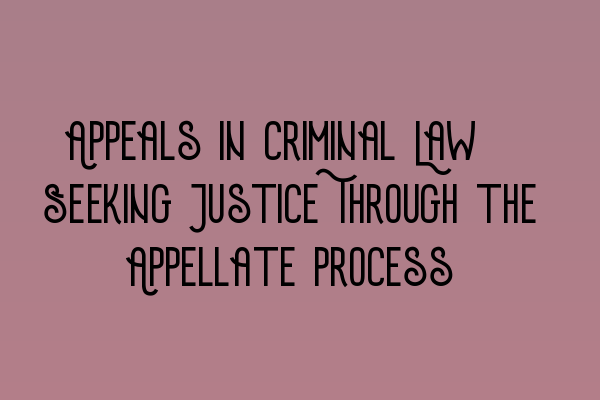Appeals in Criminal Law: Seeking Justice Through the Appellate Process
As criminal defense solicitors at SQE Criminal Law & Practice UK, we understand the importance of seeking justice for our clients. The appellate process plays a crucial role in this pursuit by providing a mechanism to challenge and review decisions made in criminal cases. In this blog post, we will explore the appeals process in criminal law, highlighting its significance and the steps involved.
Understanding the Appellate Process
The appellate process allows individuals who have been convicted or sentenced in a criminal case to challenge the decision in a higher court. It provides an avenue for review to ensure that the trial was fair, that the evidence presented was properly considered, and that the law was correctly applied.
When considering an appeal, it is essential to remember that the appellate court does not retry the case or re-evaluate the evidence. Instead, it focuses on legal errors or procedural irregularities that may have occurred during the trial.
Grounds for Appeal
There are various grounds on which an appeal can be based, including:
- Incorrect interpretation or application of the law
- Failure to consider important evidence
- Improper jury instructions
- Violation of the defendant’s constitutional rights
- Miscarriage of justice
It is crucial to consult an experienced criminal defense solicitor to determine the grounds on which you can appeal your case. At SQE Criminal Law & Practice UK, our team of legal experts can assess your situation and provide guidance tailored to your specific circumstances.
The Appeals Process
The appeals process typically involves the following steps:
- Filing a Notice of Appeal: The first step is to formally notify the appellate court of your intention to appeal. This document outlines the grounds on which you are challenging the lower court’s decision.
- Transcript Preparation: The trial transcript, which contains a verbatim record of the proceedings, needs to be prepared. This is a critical document that the appellate court will review to understand the issues raised in the appeal.
- Written Submissions: Both the appellant (the person appealing) and the respondent (the opposing party) have the opportunity to submit written arguments to the appellate court. These submissions outline the legal arguments and authorities supporting their respective positions.
- Oral Arguments: In some cases, the appellate court may schedule a hearing where the parties present oral arguments. This allows them to further explain their positions and address any questions or concerns raised by the court.
- Decision: After reviewing the written submissions, the trial transcript, and hearing oral arguments, the appellate court will render its decision. It may affirm the lower court’s decision, reverse it, or remand the case back to the lower court for further proceedings.
Seeking Professional Guidance
If you are considering filing an appeal in a criminal case, it is crucial to seek professional legal guidance. At SQE Criminal Law & Practice UK, we have a team of skilled criminal defense solicitors who can provide the expertise and support needed throughout the appellate process.
Whether you are preparing for the SQE 1 or SQE 2 exams, we offer comprehensive preparation courses to help you succeed. Check out our related articles for more information:
- SQE 1 Practice Exam Questions
- SQE 1 Practice Mocks FLK1 FLK2
- SQE 2 Preparation Courses
- SQE 1 Preparation Courses
- SRA SQE Exam Dates
By enrolling in our courses, you can enhance your knowledge and skills in criminal law and increase your chances of success in the SQE exams.
Remember, the appeals process serves as an essential tool in seeking justice. If you believe that errors were made in your criminal case, don’t hesitate to explore your options and consult a qualified solicitor experienced in handling appeals.
For expert legal assistance and guidance, contact SQE Criminal Law & Practice UK today. Our dedicated team of professionals is ready to help you navigate the complex appellate process and fight for justice.
